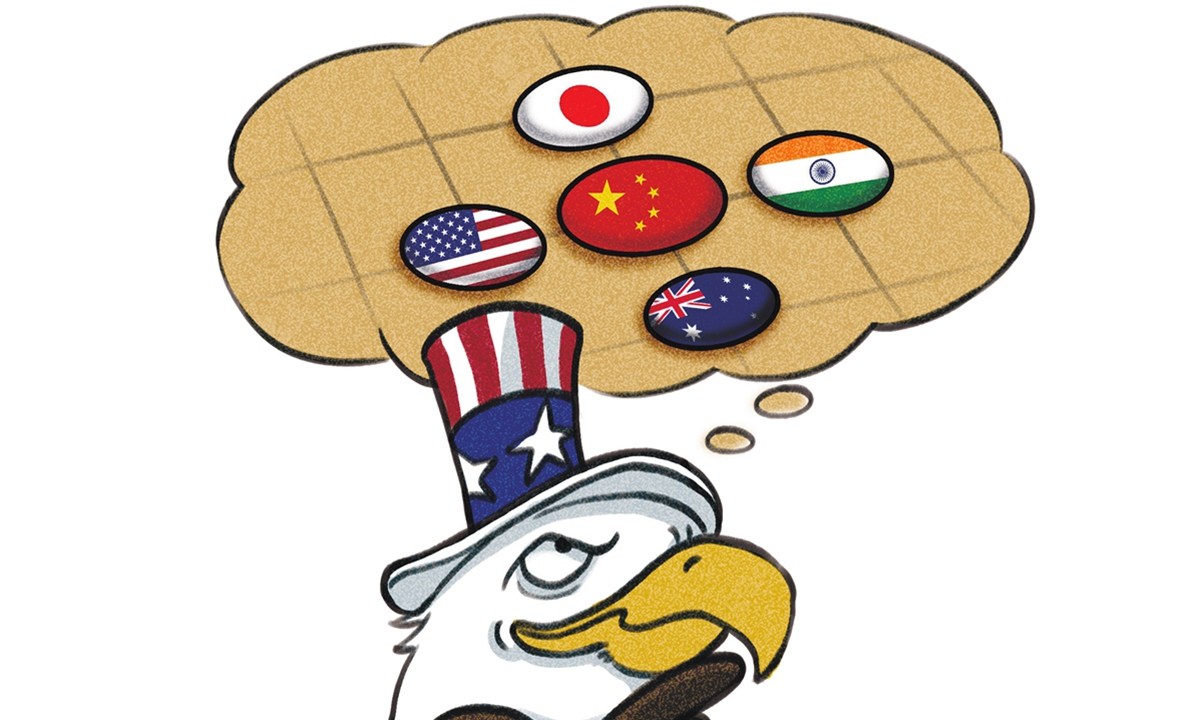
Illustration: Liu Rui/GT
Washington D.C. outlet The Hill on Saturday posted an article entitled, "Why the Quad should morph into a treaty-based economic alliance." It wrote "if the Quad is to function properly, members must consider forming an economic "NATO" - a treaty-based economic alliance, wherein all commit to defending each other economically if China retaliates against any member."
Such rhetoric is not unexpected. Actually, the most important fields of strategic competition between China and the US are economics and technology, instead of military matters. Washington intends to remain on the same page with its allies and partners in terms of suppressing China in economics, countering Beijing with cutting-edge high-tech industries; including chips, 5G, and artificial intelligence. Washington has been clearly aware that it cannot contain China alone. Even though the Quad initially focuses on security and military cooperation, some people in the US are calling for cooperation with Quad members in the field of economics.
Washington has groundlessly accused Beijing of attempting to resort to economic means to divide US alliances. Although China does not have this intention, Washington is upset about China's economic collaboration with its allies — such as the Regional Comprehensive Economic Partnership (RCEP) agreement with Japan, South Korea and Australia, and China-EU Comprehensive Agreement on Investment. Washington has also accused China of economic coercion against its allies. Against this backdrop, some Americans believe it is necessary to call on allies to present a united front against China.
In this light, cooperation of Quad members may extend to economics. Washington may collaborate with other Quad members, namely Japan, Australia and India, on some specific projects, commodities, or certain industrial chains to pile more pressure on China. It is still too early to imagine that the Quad will evolve into a formal alliance. Its member countries are more divided in terms of economics, ergo this bloc will hardly become an "economic alliance."
In the era of globalization, every country is interdependent. As the second-largest economy, China has become the biggest trade partner of many US allies. The US cannot interrupt other three members' trade exchanges with China, nor their reliance on the vast Chinese market. Take Japan for example. As one of the crucial allies of the US, Japan's recent narratives and moves toward the Taiwan question and the South China Sea issue have followed the US' lead. But Japan's approval of the RCEP displays the fact that Japan will not engage in economic confrontations with China.
If Quad members expand their coordination to economic sphere and take measures that substantially hurt China, the latter will certainly take countermeasures.
Apart from economics, Washington has recently attempted to extend Quad cooperation into other domains. For example, the White House said on March 12 that Quad partners will launch the Quad Vaccine Partnership to counter China's so-called vaccine diplomacy.
The Biden administration is trying to fill the Quad cooperation with new content, such as economics, human rights, and public health. This is being done in a bid to reinforce the Quad framework. Washington hopes that the three members will share the burden of counterbalancing China. These countries will verbally echo Washington. But it remains to be seen whether or not they can put it into practice (or to what extent they are capable of) helping the US check China.
The coronavirus pandemic is one of the touchstones of Quad collaboration. With the pandemic out of control in India, New Delhi urgently needs to expand national vaccinations. But the US' restrictions on the export of key raw materials for the manufacture of COVID-19 vaccines have threatened to slow India's vaccination drive. Despite the US loosing the restrictions, this has deepened India's distrust of the US.
Furthermore, Canberra has been gradually losing Chinese market as its bilateral ties with China have deteriorated. The US, as a close ally of Australia, is eager to fill this void. China's coal imports from Australia have dropped to zero in December 2020, while the US sold nearly 300,000 tones of coking coal to China in February, according to a report by South China Morning Post. The report also quoted analysts saying Australia's loss has created new gains for the US.
Given the US' similar practices, the three Quad members will suspect Washington's sincerity to cooperate with them. They will doubt whether the US is a reliable partner or ally going forward.
In the future, the Quad framework may remain in place, as all four countries want to exploit it as a mechanism to counter China's rise. But the four members will also take what they need from the group. It is hard to expect the Quad will maintain a close alliance that seeks to check and balance China in a confrontational way. In fact, there is considerable uncertainty about the future development of the Quad.
The author is deputy director of the Center for American Studies at Fudan University. opinion@globaltimes.com.cn




